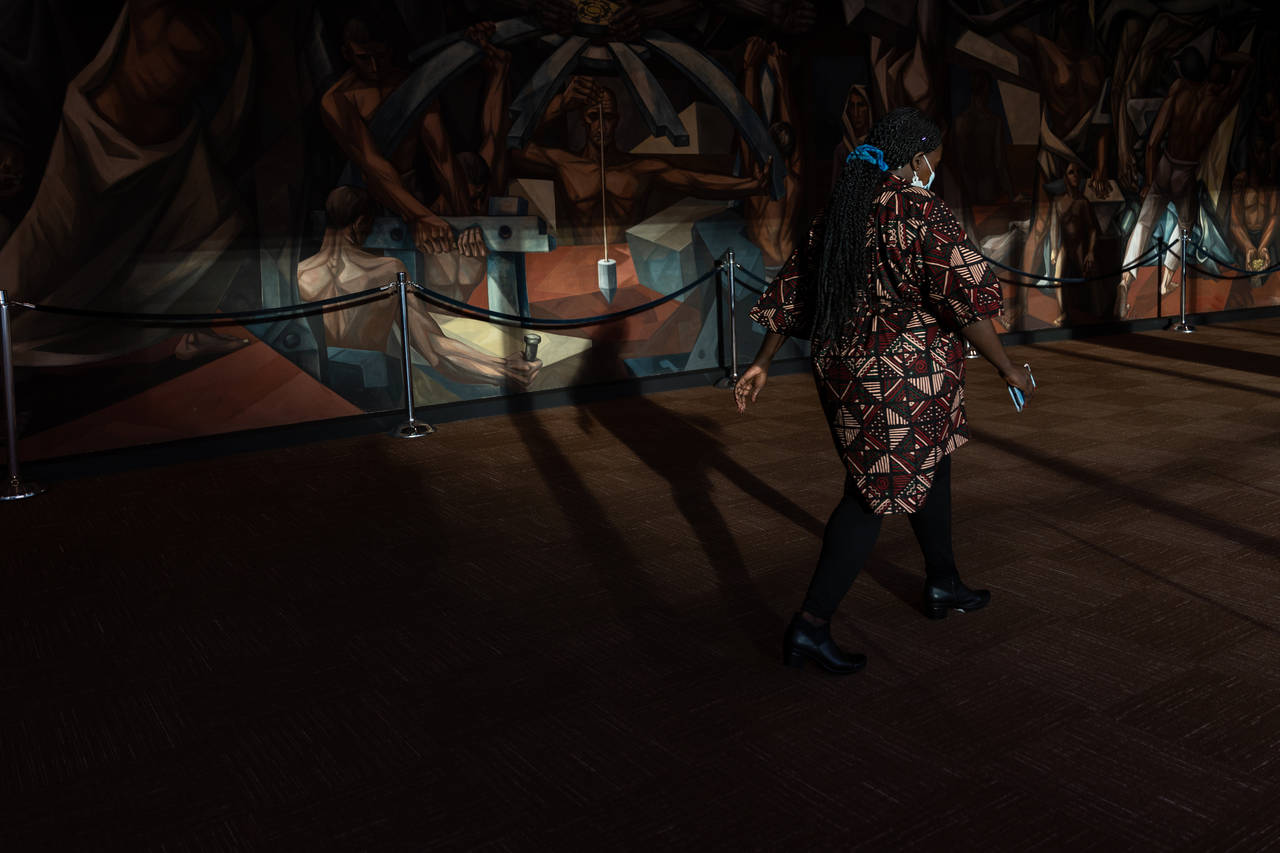At UN, despite global morass, hope peeks through the gloom
Sep 20, 2022, 9:06 AM | Updated: Sep 21, 2022, 3:24 pm

A person walks through the United Nations headquarters, Tuesday, Sept. 20, 2022, in New York. (AP Photo/Julia Nikhinson)
(AP Photo/Julia Nikhinson)
UNITED NATIONS (AP) — The head of the United Nations had just warned of a world gone badly wrong — a place where inequity was on the rise, war was back in Europe, fragmentation was everywhere, the pandemic was pushing onward and technology was tearing things apart as much as it was uniting them.
“Our world is in big trouble. Divides are growing deeper. Inequalities are growing wider. Challenges are spreading farther,” Secretary-General Antonio Guterres said Tuesday morning as he opened the general debate at the 77th U.N. General Assembly. And he was, on all counts, incontrovertibly correct.
Yet barely an hour later, here were two U.N. delegates — one Asian, one African — grinning and standing in the sun-dappled lobby of the U.N. Secretariat Building, thrilled to be there in person on this particular morning as they snapped photos of each other, laughing along the way as they captured the moment.
Hope: It can be hard to find anywhere these days, much less for the people who walk the floors of the United Nations, where shouldering the world’s weight is central to the job description. After all, this is an institution that listened last year as the president of the not-yet-at-war nation of Ukraine described it as being “like a retired superhero who has long forgotten how great they once were.”
And when world leaders are trying to solve some of humanity’s thorniest problems — or, to be frank, sometimes to impede solutions to those same problems — it’s easy, from a distance, to lose sight of hope through the haze of negative adjectives.
Yet beneath the layers of existential gloom Tuesday — and this is no doubt a pandemic-exhausted group of people representing a world in a really bad mood from so many disquieting challenges — there were signs of brightness poking through like persistent clovers in the sidewalk cracks.
“For each and every one of us, the U.N. is a unique platform for dialogue and for cooperation,” Swiss President Ignazio Cassis said. Philippines President Ferdinand Marcos Jr. spoke of his country being an “optimistic” nation for whom “solutions are within our collective grasp.”
“There’s one friend of mine who is a neurosurgeon who said my problem is I’m a congenital optimist,” U.S. President Joe Biden said on Wednesday ahead of a meeting with Guterres. “But I am optimistic. I think we can make things better.”
And David Kabua, president of the ocean-besieged Marshall Islands — a man who has little reason to express optimism these days — came to the United Nations and spoke of “this iconic hall, the symbol of humanity’s hope and aspiration for world peace, prosperity, and international cooperation.”
“As humanity strives to defend freedom and build lasting peace, the U.N.’s role is indispensable,” said South Korean President Yoon Suk Yeol.
There were many other such moments Tuesday and Wednesday. Taken together, they are noteworthy: There seems a collective sense — echoed by leader after leader in different, sometimes oblique ways — that even when it disappoints or falters, the United Nations must be a place of hope amid the cold-eyed pragmatism.
Why is that? Part of it is the unswerving commitment since the U.N.’s very beginnings to the principle of multilateralism, a $10 word for playing nicely with each other. And to play nicely when your feuds are ancient or bloody or seemingly insurmountable — to even try — requires hope.
That’s always been true, though. There’s also something else, something unique to this year, to this moment. In the frightening early pandemic days of 2020, the U.N. General Assembly was all virtual, and leaders stayed home and made videos. Last year, despite a theme of “Building Resilience Through Hope,” the hybrid General Assembly produced spotty leader attendance and little sense of the world congregating.
Now, though the pandemic persists, the U.N. grounds are alive with people from most of the planet’s backgrounds and traditions, interacting and talking and generally doing what the United Nations was built to do — take nations and turn them into people, as the late Sen. William Fulbright used to say.
Even when nothing is in session, they’re doing what the whole outfit was designed to do — figuring out, bit by bit, what the world should look like.
“It’s the only place in international organizations where there is this effort to define what is collectively shared,” says Katie Laatikainen, a professor of political science and international relations at Adelphi University in Garden City, New York, who studies the United Nations.
“They’re working to figure out what it means to be part of the international community,” she says. “They’ve learned the language of appealing to the `we,’ and it encourages others to define the `we’ and commit to the `we.'”
Guterres made sure to infuse that sensibility as he opened the proceedings with his doom-saturated speech. He told of a ship called the Brave Commander, loaded with Ukrainian grain and — helped by the warring nations of Ukraine and Russia — headed for the Horn of Africa, where it can help prevent famine.
It flew under a U.N. flag, and Guterres said it and the dozens of ships that followed were not only carrying grain; they were carrying “one of today’s rarest commodities” — hope.
“By acting as one,” he said, “we can nurture fragile shoots of hope.”
So, no: Hope is not absent at the United Nations this week. That much is certain. It’s contained, it’s muted, it’s tentative. But it is there, gossamer though it might be — even if some might find the notion naive. “Our opportunity is here and now,” said the president of the General Assembly, Csaba Korösi of Hungary.
The world, after all, is not an easy place. Was it ever? The second secretary-general of the United Nations, Dag Hammarskjöld, understood that. “The United Nations was not created in order to bring us to heaven,” he said, “but in order to save us from hell.”
___
Ted Anthony, AP’s director of new storytelling and newsroom innovation, has been writing about international affairs since 1995 and has supervised U.N. General Assembly coverage since 2017. Follow him on Twitter at http://twitter.com/anthonyted and, for more AP coverage of the UNGA, visit https://apnews.com/hub/united-nations-general-assembly
Copyright © The Associated Press. All rights reserved. This material may not be published, broadcast, rewritten or redistributed.
















